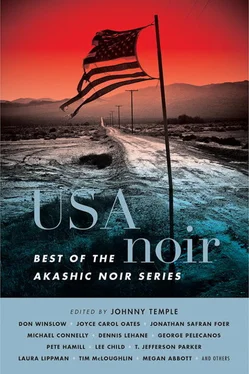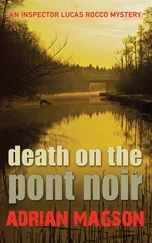Johnny Temple - USA Noir - Best of the Akashic Noir Series
Здесь есть возможность читать онлайн «Johnny Temple - USA Noir - Best of the Akashic Noir Series» весь текст электронной книги совершенно бесплатно (целиком полную версию без сокращений). В некоторых случаях можно слушать аудио, скачать через торрент в формате fb2 и присутствует краткое содержание. Город: New York, Год выпуска: 2013, ISBN: 2013, Издательство: Akashic Books, Жанр: Триллер, Детектив, на английском языке. Описание произведения, (предисловие) а так же отзывы посетителей доступны на портале библиотеки ЛибКат.
- Название:USA Noir: Best of the Akashic Noir Series
- Автор:
- Издательство:Akashic Books
- Жанр:
- Год:2013
- Город:New York
- ISBN:978-1-61775-189-9
- Рейтинг книги:3 / 5. Голосов: 1
-
Избранное:Добавить в избранное
- Отзывы:
-
Ваша оценка:
- 60
- 1
- 2
- 3
- 4
- 5
USA Noir: Best of the Akashic Noir Series: краткое содержание, описание и аннотация
Предлагаем к чтению аннотацию, описание, краткое содержание или предисловие (зависит от того, что написал сам автор книги «USA Noir: Best of the Akashic Noir Series»). Если вы не нашли необходимую информацию о книге — напишите в комментариях, мы постараемся отыскать её.
USA Noir: Best of the Akashic Noir Series — читать онлайн бесплатно полную книгу (весь текст) целиком
Ниже представлен текст книги, разбитый по страницам. Система сохранения места последней прочитанной страницы, позволяет с удобством читать онлайн бесплатно книгу «USA Noir: Best of the Akashic Noir Series», без необходимости каждый раз заново искать на чём Вы остановились. Поставьте закладку, и сможете в любой момент перейти на страницу, на которой закончили чтение.
Интервал:
Закладка:
“Quit your screaming now, boy,” I say. “Wanna hear the hooves coming near. That’s the Holy Ghost almost in me.”
Deacon Nate’s baritone sounds down in Row Two. “It’s him, that black Satan, Moral,” he yells. “Good Lord of Mercy, Church, put him down now!”
The wicked do come for me, just like in their Book. But they ain’t swift as the Holy Ghost or this blazing white horse riding in from Galilee.
I leap into their path. “Praise you in me, all up in me. You in me real good.” I sing and dance my chicken dance, arms and legs and Good News flapping all about in the first balcony aisle. “Stay up in me. You my salvation, Glory. Praise you in me.”
WHEN ALL THIS WAS BAY RIDGE
by Tim Mcloughlin
Standing in church at my father’s funeral, I thought about being arrested on the night of my seventeenth birthday. It had occurred in the train yard at Avenue X, in Coney Island. Me and Pancho and a kid named Freddie were working a three-car piece, the most ambitious I’d tried to that point, and more time-consuming than was judicious to spend trespassing on city property. Two Transit cops with German shepherds caught us in the middle of the second car. I dropped my aerosol can and took off, and was perhaps two hundred feet along the beginning of the trench that becomes the IRT line to the Bronx, when I saw the hand. It was human, adult, and severed neatly, seemingly surgically, at the wrist. My first thought was that it looked bare without a watch. Then I made a whooping sound, trying to take in air, and turned and ran back toward the cops and their dogs.
At the 60th Precinct, we three were ushered into a small cell. We sat for several hours, then the door opened and I was led out. My father was waiting in the main room, in front of the counter.
The desk sergeant, middle-aged, black, and noticeably bored, looked up briefly. “Him?”
“Him,” my father echoed, sounding defeated.
“Goodnight,” the sergeant said.
My father took my arm and led me out of the precinct. As we cleared the door and stepped into the humid night he turned to me and said, “This was it. Your one free ride. It doesn’t happen again.”
“What did it cost?” I asked. My father had retired from the police department years earlier, and I knew this had been expensive.
He shook his head. “This once, that’s all.”
I followed him to his car. “I have two friends in there.”
“Fuck’em. Spics. That’s half your problem.”
“What’s the other half?”
“You have no common sense,” he said, his voice rising in scale as it did in volume. By the time he reached a scream he sounded like a boy going through puberty. “What do you think you’re doing out here? Crawling ’round in the dark with the niggers and the spics. Writing on trains like a hoodlum. Is this all you’ll do?”
“It’s not writing. It’s drawing. Pictures.”
“Same shit, defacing property, behaving like a punk. Where do you suppose it will lead?”
“I don’t know. I haven’t thought about it. You had your aimless time, when you got out of the service. You told me so. You bummed around for two years.”
“I always worked.”
“Part-time. Beer money. You were a roofer.”
“Beer money was all I needed.”
“Maybe it’s all I need.”
He shook his head slowly, and squinted, as though peering through the dirty windshield for an answer. “It was different. That was a long time ago. Back when all this was Bay Ridge. You could live like that then.”
When all this was Bay Ridge. He was masterful, my father. He didn’t say when it was white, or when it was Irish, or even the relatively tame when it was safer. No. When all this was Bay Ridge. As though it were an issue of geography. As though, somehow, the tectonic plate beneath Sunset Park had shifted, moving it physically to some other place.
I told him about seeing the hand.
“Did you tell the officers?”
“No.”
“The people you were with?”
“No.”
“Then don’t worry about it. There’s body parts all over this town. Saw enough in my day to put together a baseball team.” He drove in silence for a few minutes, then nodded his head a couple of times, as though agreeing with a point made by some voice I could not hear. “You’re going to college, you know,” he said.
That was what I remembered at the funeral. Returning from the altar rail after receiving communion, Pancho walked passed me. He’d lost a great deal of weight since I’d last seen him, and I couldn’t tell if he was sick or if it was just the drugs. His black suit hung on him in a way that emphasized his gaunt frame. He winked at me as he came around the casket in front of my pew, and flashed the mischievous smile that—when we were sixteen—got all the girls in his bed and all the guys agreeing to the stupidest and most dangerous stunts.
In my shirt pocket was a photograph of my father with a woman who was not my mother. The date on the back was five years ago. Their arms were around each other’s waists and they smiled for the photographer. When we arrived at the cemetery I took the picture out of my pocket, and looked at it for perhaps the fiftieth time since I’d first discovered it. There were no clues. The woman was young to be with my father, but not a girl. Forty, give or take a few years. I looked for any evidence in his expression that I was misreading their embrace, but even I couldn’t summon the required naïveté. My father’s countenance was not what would commonly be regarded as a poker face. He wasn’t holding her as a friend, a friend’s girl, or the prize at some retirement or bachelor party; he held her like a possession. Like he held his tools. Like he held my mother. The photo had been taken before my mother’s death. I put it back.
I’d always found his plodding predictability and meticulous planning of insignificant events maddening. For the first time that I could recall, I was experiencing curiosity about some part of my father’s life.
I walked from Greenwood Cemetery directly to Olsen’s bar, my father’s watering hole, feeling that I needed to talk to the men that nearly lived there, but not looking forward to it. Aside from my father’s wake the previous night, I hadn’t seen them in years. They were all Irish. The Irish among them were perhaps the most Irish, but the Norwegians and the Danes were Irish too, as were the older Puerto Ricans. They had developed, over time, the stereotypical hooded gaze, the squared jaws set in grim defiance of whatever waited in the sobering daylight. To a man they had that odd trait of the Gaelic heavy-hitter, that—as they attained middle age—their faces increasingly began to resemble a woman’s nipple.
The door to the bar was propped open, and the cool damp odor of stale beer washed over me before I entered. That smell has always reminded me of the Boy Scouts. Meetings were Thursday nights in the basement of Bethany Lutheran Church. When they were over, I would have to pass Olsen’s on my way home, and I usually stopped in to see my father. He would buy me a couple of glasses of beer—about all I could handle at thirteen—and leave with me after about an hour so we could walk home together.
From the inside looking out: Picture an embassy in a foreign country. A truly foreign country. Not a Western European ally, but a fundamentalist state perennially on the precipice of war. A fill-the-sandbags-and-wait-for-the-airstrike enclave. That was Olsen’s, home to the last of the donkeys, the white dinosaurs of Sunset Park. A jukebox filled with Kristy McColl and the Clancy Brothers and flyers tacked to the flaking walls advertising step-dancing classes, Gaelic lessons, and the memorial run to raise money for a scholarship in the name of a recently slain cop. Within three blocks of the front door you could attend a cockfight, buy crack, or pick up a streetwalker, but in Olsen’s, it was always 1965.
Читать дальшеИнтервал:
Закладка:
Похожие книги на «USA Noir: Best of the Akashic Noir Series»
Представляем Вашему вниманию похожие книги на «USA Noir: Best of the Akashic Noir Series» списком для выбора. Мы отобрали схожую по названию и смыслу литературу в надежде предоставить читателям больше вариантов отыскать новые, интересные, ещё непрочитанные произведения.
Обсуждение, отзывы о книге «USA Noir: Best of the Akashic Noir Series» и просто собственные мнения читателей. Оставьте ваши комментарии, напишите, что Вы думаете о произведении, его смысле или главных героях. Укажите что конкретно понравилось, а что нет, и почему Вы так считаете.












